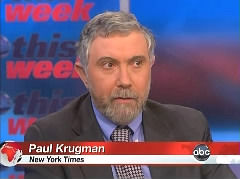Paul Krugman, Somewhat Leashed
Here's Krugman trying to be fair to his political enemies, who prefer their "capitalism red in tooth and claw": "The other side believes that people have a right to keep what they earn, and that taxing them to support others, no matter how needy, amounts to theft. That's what lies behind the modern right's fondness for violent rhetoric: many activists on the right really do see taxes and regulation as tyrannical impositions on their liberty."
Published: 1/14/2011 12:13 PM ET
Is Paul Krugman actually trying to heed Obama's call for civility in Friday's column "A Tale Of Two Moralities"? He seems to be straining not to unleash the inner Krugman, albeit not particularly effectively.
Krugman ended by firing up his favorite phrase, popular among the more screeching members of the left as a catch-all for Republican metaphorical language they deem threatening.
On Wednesday, President Obama called on Americans to "expand our moral imaginations, to listen to each other more carefully, to sharpen our instincts for empathy, and remind ourselves of all the ways our hopes and dreams are bound together." Those were beautiful words; they spoke to our desire for reconciliation.
....One side of American politics considers the modern welfare state - a private-enterprise economy, but one in which society's winners are taxed to pay for a social safety net - morally superior to the capitalism red in tooth and claw we had before the New Deal. It's only right, this side believes, for the affluent to help the less fortunate.
The other side believes that people have a right to keep what they earn, and that taxing them to support others, no matter how needy, amounts to theft. That's what lies behind the modern right's fondness for violent rhetoric: many activists on the right really do see taxes and regulation as tyrannical impositions on their liberty.
There's no middle ground between these views. One side saw health reform, with its subsidized extension of coverage to the uninsured, as fulfilling a moral imperative: wealthy nations, it believed, have an obligation to provide all their citizens with essential care. The other side saw the same reform as a moral outrage, an assault on the right of Americans to spend their money as they choose.
....
But that was then. Today's G.O.P. sees much of what the modern federal government does as illegitimate; today's Democratic Party does not. When people talk about partisan differences, they often seem to be implying that these differences are petty, matters that could be resolved with a bit of good will. But what we're talking about here is a fundamental disagreement about the proper role of government.
Krugman ended by firing up his favorite phrase, popular among the more screeching members of the left as a catch-all for Republican metaphorical language they deem threatening.
Right now, each side in that debate passionately believes that the other side is wrong. And it's all right for them to say that. What's not acceptable is the kind of violence and eliminationist rhetoric encouraging violence that has become all too common these past two years.If Krugman needs a reminder of left-wing violence since George W. Bush's election in 2000, he should glance over Michelle Malkin's comprehensive, and saddening, round-up.



